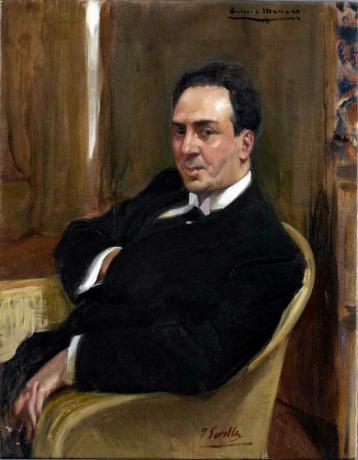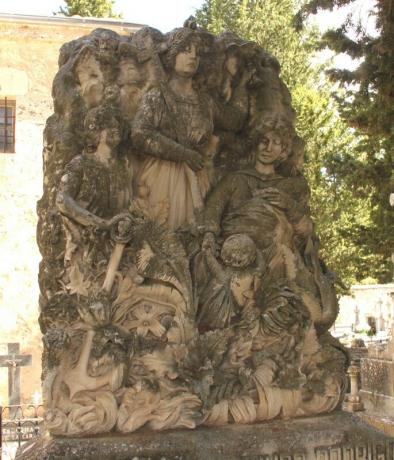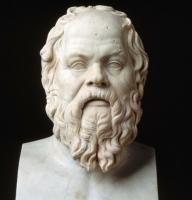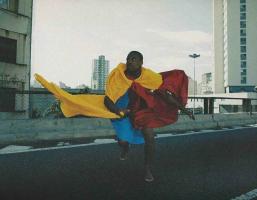Antonio Machado: 21 annotated poems
Antonio Machado was an Andalusian poet, playwright and storyteller of the "generation of 98" in Spain. In addition to accusing the influence of modernism, his work stands out for three aspects: the training that received, both from the Free Institution of Education and from his father, concerned about folklore Spanish; the influence of philosophy and reflection on Spain.
Next, we present a list of poems by Antonio Machado that are essential to understand the style, motivations and concerns of this distinguished Spanish writer.

1. The Saeta
"La saeta" is a poem included in the book Castile fields, first published in 1912. It is openly inspired by the musical genre of the saeta, a popular song typical of the Holy Week festivities in Andalusia and other regions of Spain.
He said a popular voice:
«Who can lend me a ladder,
to climb the tree
to remove the nails
Jesus the Nazarene? »Oh the arrow, the singing
to the Christ of the gypsies,
always with blood on my hands
always to unlock!
Sing of the Andalusian people
that every spring
he's asking for stairs
to climb the cross!Sing of my land,
that throws flowers
to the Jesus of agony,
and it is the faith of my elders!
Oh, you are not my song!
I can't sing, nor do I want to,
to that Jesus on the tree,
but to the one who walked in the sea!
2. Proverbs and songs ("Wayfarer there is no way")
"Proverbios y cantares" is a series of poetic passages by Machado included in Castile fields. In this poem, the writer reflects on the meaning of life, freedom and the novelty of experiences. That meaning of life is written on a blank book for all those brave people who decide to set out on the road with freedom.
In 1969, the singer Joan Manuel Serrat published an album totally dedicated to Antonio Machado, which includes a musicalized version of “Proverbios y cantares”. Serrat selected some fragments and rearranged them. The song was renamed "Cantares". In that same album there is also “La saeta”.
I
I never chased the glory
nor leave in memory
of men my song;
I love the subtle worlds
weightless and gentle
like soap foam.
I like to see them paint
of sun and scarlet, fly
under the blue sky, shake
suddenly and break.XXIX
Wayfarer, they are your footprints
the road, and nothing else;
walker, there is no path:
the path is made by walking.
When you walk you make a way,
and looking back
you see the path that never
it has to be stepped on again.
Wayfarer, there is no way,
but wakes in the sea.XLIV
Everything happens and everything is;
but ours is to pass,
pass by making paths,
roads over the sea.
3. The flies
"The flies" is a poem published in the book Solitudes. Galleries Other poems, edited in 1907. It is in a section called "Humor, fantasies, notes." In the text, the poet manages to build a poetic image around this beloved insect, which becomes a metaphor for "all things", a memory of everyday life.
You, the relatives,
inevitable sweet tooth,
you vulgar flies,
you evoke all things to me.Oh voracious old flies
like bees in April,
old stubborn flies
on my bald child!Flies of the first boredom
in the family room,
the clear summer afternoons
in which I began to dream!And in the hated school,
swift funny flies,
hunted
for the love of what flies,—That everything is to fly— sonorous,
bouncing off the glass
in the autumn days ...Flies of all hours,
of childhood and adolescence,
of my golden youth;
of this second innocence,that gives in not believing in anything,
always... Vulgar flies,
that of pure relatives
you will not have a worthy singer:I know that you have posed
about the enchanted toy,
on the closed book,
about the love letter,
on the erect eyelids
of the dead.Inevitable sweet tooth,
that neither work like bees,
nor do you shine like butterflies;
tiny, unruly,
you old friends,
you evoke all things to me.
4. The clock was ringing at one
"The clock sounded at one" is another poem from the section "Humor, fantasies, notes" of the book Solitudes. Galleries and other poems. With a humorous tone, the poetic subject shares the dislike he feels at the din of a talentless musician.
The clock was ringing one o'clock
inside my room. It was
sad the night. Moon,
shining skull,already from the zenith declining,
I was going from the cypress of the orchard
coldly illuminating
the tall stiff branches.Through the ajar window
reached my ears
metallic screams
of a distant music.Sad music,
a forgotten mazurka,
between innocent and mocking,
badly tolled and badly blown.And I felt the stupor
of the soul when yawning
the heart, the head,
Y... dying is the best.
5. Last night when i was sleeping
In this poem the writer expresses the universe of his spiritual longings that are presented to him through dreams. The poem is the representation of human concern for transcendence, for the order of the divine.
Last night when i was sleeping
I dreamed, blessed illusion!
that a fountain flowed
inside my heart.Say: why hidden ditch,
water, you come to me,
spring of new life
where I never drank?Last night when i was sleeping
I dreamed, blessed illusion!
that a hive had
inside my heart;and the golden bees
they were manufacturing in it,
with the old bitterness,
white wax and sweet honey.Last night when i was sleeping
I dreamed, blessed illusion!
that a burning sun shone
inside my heart.It was hot because it gave
heats of red hearth,
and it was sun because it lit up
and because it made them cry.Last night when i was sleeping
I dreamed, blessed illusion!
that it was God that he had
inside my heart.
6. The crime was in Granada
This poem was first published in the magazine Help, when the year 1937 passed. Then it was published in the book War, which summarizes the writings produced between 1936 and 1939. It is a text that exposes the execution of Federico García Lorca in 1936, in the context of the Spanish Civil War.
I
THE CRIME
He was seen, walking among rifles,
down a long street,
go out into the cold field,
still with stars, at dawn.
They killed Federico
When the light came out
The group of executioners did not watch his face.
They all closed their eyes;
They prayed: not even God saves you!
Federico fell dead
-blood on the forehead and lead in the entrails-.
... That the crime was in Granada know - poor Granada - in his Granada ...II
THE POET AND DEATH
He was seen walking alone with Her,
unafraid of his scythe.
-Already the sun in tower and tower; the hammers
in anvil and anvil of the forges.
Federico was speaking,
demanding death. She was listening.
"Because yesterday in my verse, partner,
the beat of your dry palms sounded,
and you gave the ice to my singing, and the edge to my tragedy of your silver sickle,
I will sing you the meat that you do not have,
the eyes that you lack,
your hair that the wind shook,
the red lips where they kissed you ...
Today like yesterday, gypsy, my death,
how nice with you alone,
in these Granada airs, my Granada! "III
He was seen walking ...
Farm friends,
of stone and dream, in the Alhambra,
a mound to the poet,
on a fountain where the water cries,
and eternally say:
the crime was in Granada, in his Granada!
7. The death of the wounded child
This poem is also part of the book War. The poet describes the scene of the death of a wounded child in the context of war, while his mother, helpless, remains awake in care.
Again in the night... It's the hammer
from the fever in the well-bandaged temples
of the child. "Mother, the yellow bird!"
The black and purple butterflies!
"Sleep, my son." —And the little hand presses
the mother, next to the bed. "Oh, flower of fire!"
Who is to freeze you, flower of blood, tell me?
There is the smell of lavender in the poor bedroom;
outside, the plump white moon
dome and tower to the gloomy city.
Invisible flycatcher.
"Are you sleeping, oh sweet flower of my blood?"
The glass on the balcony rattles.
"Oh, cold, cold, cold, cold, cold!"
8. The moon, the shadow and the jester
"The moon, the shadow and the jester" is included in the book New songs, first published in 1924. In these poems he lets his interest in the universe of popular culture and local color creep in.
I
Outside, the silver moon
domes, towers, roofs;
inside, my shadow walks
by the whitewashed walls.
With this moon it seems
that even the shadow grows old.
Let's save the serenade
of an ungrateful cenesthesia,
and a restless old age,
and a tin moon.
Close your balcony, Lucila.II
Belly and hump are painted
on the wall of my bedroom.
She sings the jester:
How well they go,
on a cardboard face,
saffron beards!
Lucila, close the balcony.
9. Songs to Guiomar (I)
"Songs to Guiomar" is a work included in the book Complete poems, in the "Apocryphal Songbook" section. Each poem is numbered. The one we present here is the first of them, related to the concept of love through a language impregnated with sensoriality. Machado's muse is Guiomar. Guiomar was long thought to be a fictitious image. Today it is known that Guiomar was the nickname Machado gave Pilar de Valderrama.
He did not know
if it was a yellow lemon
what your hand had,
or the thread of a clear day,
Guiomar, in golden ball.
Your mouth was smiling at me.
I asked: What are you offering me?
Time in fruit, that your hand
chose between maturity
from your garden?
Wasted time
of a beautiful idle afternoon?
Golden enchanted essence?
Copla in the sleeping water?
From mount to mount on fire,
the dawn
true?
Does it break in its murky mirrors
love the winder
of the old twilights of him?
10. Run away from sad love... (Sonnet V)
"Flee from sad love is" a poem written in the form of a sonnet. Included in the book New songs, the sonnet describes the meaning and attributes of true love that, fired with passion, opposes "pacato" love.
Run away from sad love, sweet love
without danger, without bandage or adventure,
who expects from love to secure a pledge,
because in love, madness is the sensible thing to do.The one that the chest avoids the blind child
and he blasphemed the fire of life,
of an ember thought, and not lit,
he wants ash to keep the fire for him.And ash he will find, not from her flame,
when I discover the clumsy delirium
that he asked, without flower, fruit on the branch.With a black key the cold room
of his time will open. Deserted bed,
and cloudy mirror and empty heart!
11. The traveler
This poem is about an allegory about the passage of time. From the formal point of view, it corresponds to the genus of silva. It has nine stanzas with consonant rhyme ABBA. The text has been published in Solitudes. Galleries Other poems.
He is in the family room, gloomy,
and between us, the dear brother
that in the childhood dream of a clear day
we saw leaving for a distant country.Today he already has silver temples,
a gray lock on the narrow forehead;
and the cold restlessness of their gazes
reveals a soul almost all absent.Ditch the autumnal cups
of the musty and old park.
The afternoon, behind the damp glass,
is painted, and at the bottom of the mirror.Brother's face lights up
gently. Flowery disappointments
golden in the afternoon that declines?
yearning New life in New Years?Will you mourn the lost youth?
Far was left - the poor wolf - dead.
The white youth never lived
afraid, that he will sing at his door?Do you smile at the golden sun
from the land of a dream not found;
and he sees his ship split the sound sea,
of wind and light the white swollen sail?He has seen the autumn leaves,
yellow, roll, the smelly ones
eucalyptus branches, rose bushes
that show again the white roses of him.And this pain that yearns or mistrusts
the trembling of a tear represses,
and a remnant of virile hypocrisy
it is imprinted on the pale countenance.Serious portrait on the light wall
yet. We digress.
In the sadness of home it hits
the ticking of the clock. We all shut up.
12. While in the shade ...
It is included in the book Solitudes, in the segment “Del camino”. In it, the poet describes the intimate and loving longing of a soul. The poet goes to the images of the known praying universe: the organ, the lectern, the chant, the word and the altar.
While the shadow passes from a holy love, today I want
put a sweet psalm on my old lectern.
I will remember the notes of the severe organ
sighing the fragrant fife of April.Autumn pomas will ripen their aroma;
myrrh and frankincense will chant the scent of it;
the rose bushes will breathe their fresh perfume,
under the peace in the shade of the warm orchard in bloom.To the slow low chord of music and aroma,
the only and old and noble reason for my pray
it will lift its soft dove flight,
and the white word will rise to the altar.
13. To the sculptor Emiliano Barral

It is a poem dedicated to the Spanish sculptor Emiliano Barral, who enjoyed the respect and admiration of the poet, and with whom he maintained a close relationship. It was written in 1922 and published in the book New songs in 1924.
... and your chisel was sculpting me
on a pink stone,
that wears a cold aurora
eternally enchanted.
And the sour melancholy
of a dreamed greatness,
what is Spanish - fantasy
with which to marinate laziness—,
it was emerging from that rose,
what is my mirror,
line to line, plane to plane,
and my mouth of thirst little,
and, in the arch of my eyebrow,
two eyes of a distant seeing,
that I would like to have
as they are in your sculpture:
dug in hard stone,
in stone, not to see.
14. And must he die with you ???
Philosophical and existential concerns were always present in Antonio Machado. In this poem, the concern about death is present through the reference to the death of the loved one. From them, the poetic reflection on the meaning of life and death unfolds. The poem is in Solitudes. Galleries Other poems.
And will the wizard world die with you
where do you keep the memory
the purest breaths of life,
the white shadow of love first,the voice that went to your heart, the hand
that you wanted to retain in dreams,
and all the loves
that reached the soul, the deep sky?And will your world die with you,
the old life in order yours and new?
The anvils and crucibles of your soul
work for the dust and for the wind?
15. I was a child who dreamed
"He was a boy who dreamed" was published for the first time in Castile fields, in the segment called “Parabolas”. Build a complete picture of human life, going through childhood, adolescence, maturity and old age.
I was a child who dreamed
a cardboard horse.
The boy opened his eyes
and the horse did not see.With a white horse
the boy dreamed again;
I took it by the mane ...
'Now you won't run away!'Barely had it caught
the boy woke up.
He had a clenched fist.
The horse flew.The boy was very serious
thinking it's not true
a dreamed horse.
And he no longer dreamed.But the boy became a boy
and the boy had a love,
and to the beloved he said:
'Are you for real or not?'When the waiter got old
he thought: everything is dreaming,
the dreamed horse
and the real horse. 'And when death came,
the old man to his heart
he asked: 'Are you a dream?'
Who knows if he woke up!
16. Says the reason
"Says reason" is also part of the "Parables" collected in Castile fields. The poet exposes the eternal dispute between reason and the heart, adding also the philosophical discussion about truth, lies, vanity and hope.
He says the reason: let's look for the truth.
And the heart: vanity,
We already have the truth.
The reason: oh, who can reach the truth!
The heart: vanity;
the truth is hope.
The reason says: you lie.
And the heart answers: who lies
it's you, reason, what do you say
what you don't feel.
The reason: we can never understand each other,
heart. The heart: we will see.
17. Poetic art
This poem is one of the first works of the author. Perhaps it was written around 1904 and published in the magazine Helios, but it was not included in his books. It was, in fact, an ignored poem. Although its title announces that it is a poetic art, we do not find clear evidence of it in development. One possible interpretation is that Machado has seen in the signs of life itself and his experience the beginning of poetic creation. In any case, this poem has been described as close to the romanticist spirit.
And in the whole soul there is only one party
you will know it, love flowery shadow,
aroma dream, and then... nothing; tatters,
rancor, philosophy.Broken in your mirror your best idyll,
And turned his back on life,
It must be your morning prayer:
Oh, to be hanged, beautiful day!
18. If I was a poet
"If I Were a Poet" plays with irony and poetic imagination. At the same time, it is a hymn to love and beauty, borrowing images from the natural and everyday world. This poem was published in "Galleries" in Solitudes. Galleries Other poems.
If I was a poet
gallant, would sing
in your eyes a song so pure
clean water like white marble.And in a stanza of water
all the singing would be:"I know that they do not respond to my eyes,
who see and do not ask when they look,
your clear ones, your eyes have
the good quiet light,
the good light of the world in bloom, that I have seen
from my mother's arms one day ”.
19. Guitar of the inn that today you sound jota
Also from the "Galleries" cycle, the poem "Guitarras del mesón que suenas jota" emphasizes the relationship between music and the poetic word. This is one of the poems that the singer Joan Manuel Serrat popularized through his album Dedicated to Antonio Machado, poet in 1969.
Guitar of the inn that today you sound jota,
Petenera tomorrow,
according to who arrives and rings
the dusty ropes.Guitar from the inn of the roads,
You were never, nor will you ever be, a poet.You are a soul that says its harmony
lonely to passing souls ...
And whenever the walker hears you
dreams of hearing an air of the land from him.
20. On the bitter land
In this poem, Antonio Machado exposes the pains of life, the recesses of the anguish that, as the years go by, make their way. A world of nostalgia and absences are revealed before our eyes. The poem is part of the book Solitudes. Galleries and other poems, and is located in the section "Of the road".
On the bitter land,
roads has the dream
labyrinthine, winding paths,
parks in bloom and in shadow and in silence;deep crypts, scales on stars;
altarpieces of hopes and memories.
Figurines that pass and smile
—Spoken old man's toys—;friendly images,
at the flowery turn of the path,
and pink chimeras
that make way... far...
21. It's you, Guadarrama, old friend (Roads)
This text is part of the collection of poems Castile fields. In the poem, which dates from 1911, the writer exposes the value that the Sierra del Guadarrama had for him, a place where his memories are sharpened.
Are you, Guadarrama, old friend,
the gray and white sierra,
the mountains of my Madrid afternoons
that I saw in the painted blue?Through your deep ravines
and for your sour peaks,
a thousand Guadarramas and a thousand suns come,
riding with me, to your entrails.



